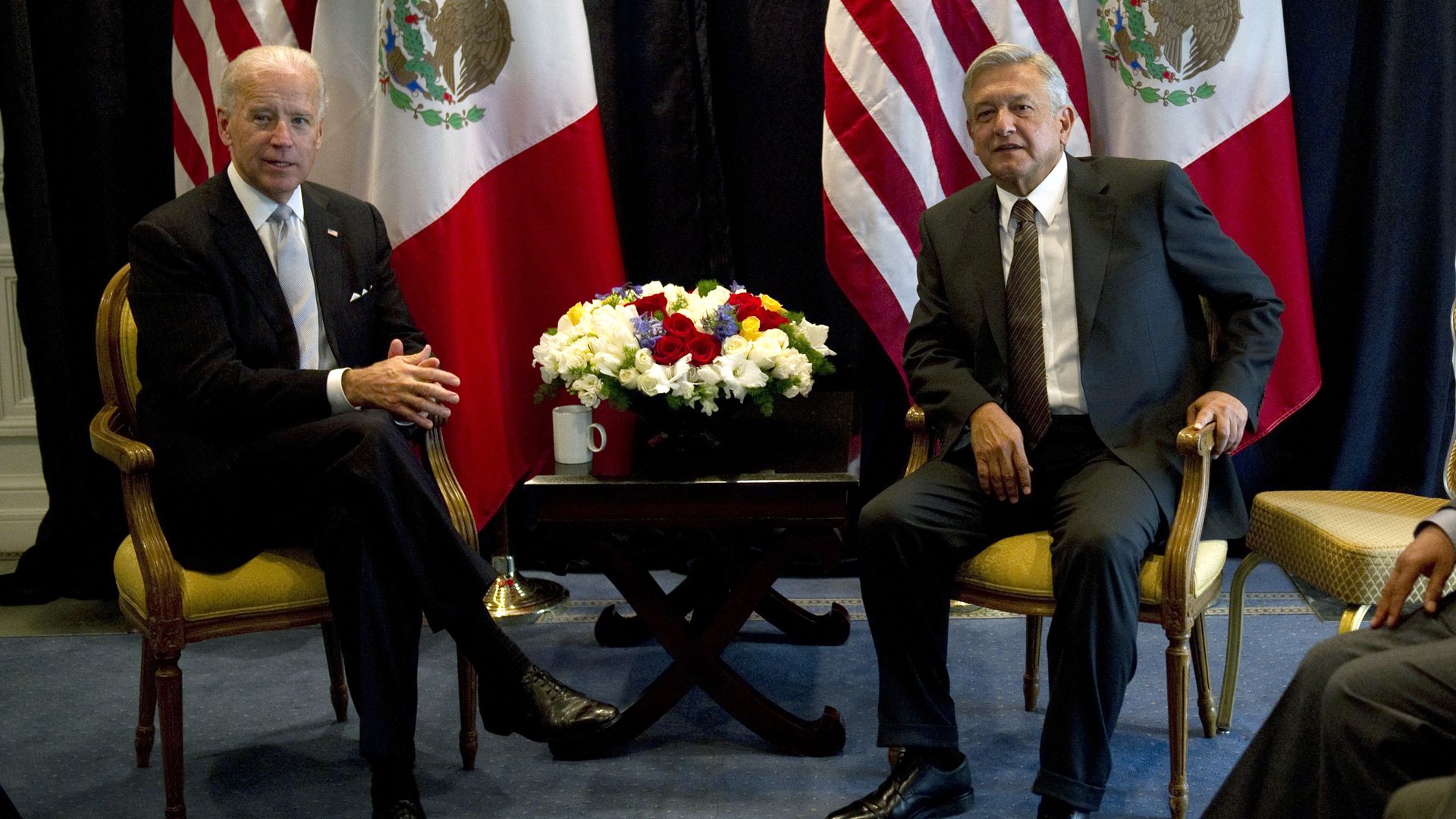Biden could face early tensions with Mexico's López Obrador
Add Axios as your preferred source to
see more of our stories on Google.

Biden (then VP) and López Obrador (then a presidential candidate) in Mexico City in 2012. Photo: Uri Cortez/AFP via Getty
Mexican President Andrés Manuel López Obrador is off to an awkward start with President-elect Biden. Along with Russia’s Vladimir Putin and Brazil’s Jair Bolsonaro, he's one of the very few world leaders still declining to recognize Biden’s victory.
Why it matters: López Obrador’s stance may soon be forgotten, but it could foreshadow tensions in a relationship that will be crucial in the coming years as the U.S. and Mexico attempt to contain COVID-19, rebuild their economies and tackle shared challenges like immigration.
The big picture: Trump has focused U.S.-Mexico relations almost entirely on two issues — stopping migrants from crossing America's southern border and renegotiating the NAFTA trade deal.
- Since taking office two years ago, López Obrador has acceded to Trump's demands by increasing immigration enforcement and agreeing to hold asylum-seekers on the Mexican side of the border.
“What Trump cared about was stopping migrants," says Shannon O'Neil, a Latin America expert at the Council on Foreign Relations.
- "As long as López Obrador stopped migrants from coming up, or took them back when they did, most of the other things that happened in Mexico were not of interest to the Trump administration. I think that’s going to be very different in a Biden administration.”
- "You’re going to see a Biden administration that cares about the environment, that cares about labor issues, that cares about human rights, that cares about democratic governance," O'Neil says.
- “It’ll be both a more fruitful relationship between the two countries and a more difficult one.”
Driving the news: Tensions in the relationship rose dramatically in October, after the U.S. Drug Enforcement Administration (DEA) blindsided the Mexican government by arresting former Mexican Defense Secretary Gen. Salvador Cienfuegos on drug-trafficking charges.
- The Department of Justice unexpectedly dropped those charges last month and allowed Cienfuegos to return to Mexico, apparently in an attempt to avert a deeper crisis with Mexico.
- But López Obrador has now floated a policy that would strip DEA agents of diplomatic immunity and require them to turn over any information they collect in Mexico to the government.
- Earl Anthony Wayne, a former U.S. ambassador to Mexico (2011–2015), says that's a sign that rather than taking the chance to smooth things over, "they’re going in a more nationalist direction."
Zoom out: López Obrador has shown little interest in building deep relationships with the U.S. or the international community, focusing almost entirely on domestic issues.
Yes, but: "Mexico is so dependent on its relations with the United States — especially in the economic arena — that he can’t not pay attention and can’t not be concerned," Wayne says.
- Wayne says relations between Biden and López Obrador could face an "early test" if there's a surge in migrants heading north from Central America, as some are already predicting.
- Both leaders have called for investment in Central America to stem the root causes of migration. For now, the U.S. is still reliant on Mexico to prevent a crisis at the border, Wayne says.
- Other potential areas of tension include Mexico's willingness to enforce stricter labor standards under the new trade deal as well as longstanding issues like drugs heading north and guns heading south.
The bottom line: "It’s not immediately evident that it’s going to be an easy relationship," Wayne says. "It might be a workable relationship, but that isn’t the same as a relationship where it’s easy to keep things going and you can plan for the future.”
Worth noting: López Obrador was himself on the losing side of a disputed election in 2006, something he's cited in declining to dismiss Trump's election claims.
